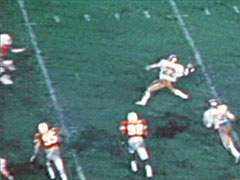broadband / modem
Audio only
Published: December 2004
On November 5 and 6, 2004, Boston College hosted a celebration in honor of the 1984 football team, which achieved greater prominence than any BC football team since the Eagles defeated Tennessee in the 1941 Sugar Bowl. More than 100 attendees—coaches, players, managers, family members, and friends—gathered on Friday evening for dinner in Conte Forum’s Shea Room, named after the late Joseph Shea, SJ, who served as the University representative to athletic teams, including the 1984 squad. Reid Oslin ’68, director of sports information in 1984, presided over the event, introducing remarks from head football coach Tom O’Brien, athletic director Gene De Filippo, 1984 head coach Jack Bicknell, 1984 tri-captain Scott Harrington ’85, and Chancellor J. Donald Monan, SJ, president of Boston College from 1972 to 1996, who noted that the 1984 season “made a very distinctive contribution to the entire University,” and “opened Boston College to extraordinary national visibility.” The following day, team members took part in a tribute on the Alumni Stadium field at halftime of the Rutgers game, applauded by fans who may or may not have watched them play in 1984 but who know them by the stories of their exceptional accomplishments.
When Bicknell joined Boston College in 1981, the Eagles were coming off a string of unsuccessful seasons, and BC was a hard sell to student athletes who wanted to win against nationally ranked teams. Bicknell’s first season—featuring a decidedly tough schedule—concluded with an acceptable 5-6 record. But it was a decision by Bicknell during the Penn State game in October 1981 that started the run to the Cotton Bowl. With the team down 38–0 early in the fourth quarter, the coach put in fourth-string quarterback Doug Flutie ’85. While the Eagles still lost, Flutie passed for 135 yards and put Boston College on the board with a touchdown. Bicknell later commented, “It was like somebody hit a switch and the tempo went up.”
The Eagles went on to three seasons of national rankings, bowl games, and All-America awards for players. In the 1982 season, the Eagles experienced their first bowl appearance since 1943, a 33–26 loss to Auburn at the Tangerine Bowl. The following year, a Liberty Bowl matchup brought another loss, by a score of 19-18 to Notre Dame.
The 1984 Eagles began the season with four straight wins, including a nationally televised away game at Alabama, and a 52–20 defeat of North Carolina at Foxborough’s Sullivan Stadium, former home of the New England Patriots. Back at Alumni Stadium, they scored wins over both Temple and Rutgers. In November, they returned to Foxborough to defeat Syracuse 24–16 and then went on to Miami, where they won 47–45 on the Flutie-to-Phelan “Hail Mary Pass.” In December, on the day of the team’s final game at Holy Cross, Flutie was named the 1984 Heisman Trophy winner.
The Eagles were paired with the University of Houston in the 1985 Cotton Bowl. More than 10,000 people were shuttled to Dallas from Boston for the game—the largest single airlift to one destination from Boston since World War II. On January 1, 1985, the Eagles won their first bowl game in more than forty years, beating the Cougars 45–28. Team members Ken Bell ’86, John Bosa ’86, Darren Flutie ’88, Doug Flutie, Mark MacDonald ’84, Kelvin Martin ’87, Dave Nugent ’87, Gerard Phelan ’85, Bill Romanowski ’88, Mike Ruth ’86, Steve Strachan ’85, Troy Stradford ’86, Steve Trapilo ’86, and Doug Widell ’88 all went on to play professional football.
For the 20th anniversary event, more than 40 players and their families traveled from 14 states to Chestnut Hill. Today, their careers range across investment banking, sports management, broadcasting, software, marketing, and law. Tom Porell ’87, a defensive tackle for the team and now a sales executive for an employee benefits consulting firm in Boston, summed it up this way: “It’s great to see everyone, old friends, old teammates. It seems like it’s 1984 all over again, and tomorrow we’ll be out on the field. Not a week goes by when someone doesn’t ask me what it was like to have been on the field in Miami when Phelan caught that pass. None of us could have dreamed of where we would go when we signed on for the team. It was simply the experience of a lifetime.”

